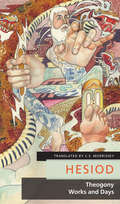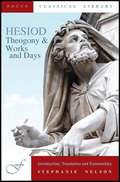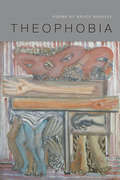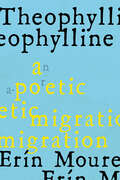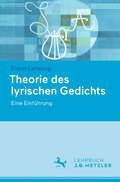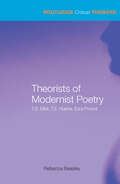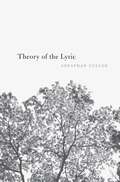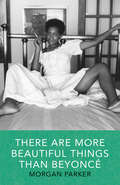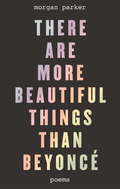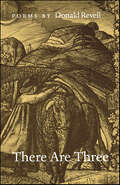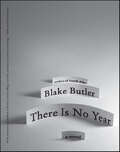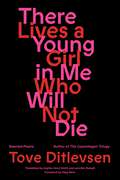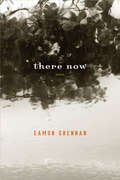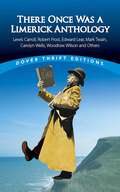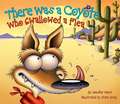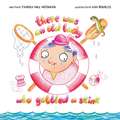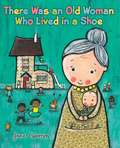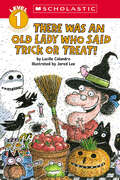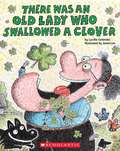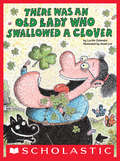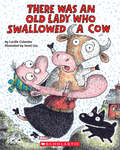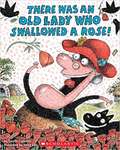- Table View
- List View
Theogony / Works and Days
by Hesiod Roger Scruton Eric Voegelin C. S. MorrisseyPhilosopher C.S. Morrissey adapts Hesiod's two great works, Theogony and Works and Days, taking into account the poet's essential meditative insights that paved the way for the subsequent achievements of Greek philosophy,most notably of Plato, and thereby gave a distinctive shape to all of Western philosophy. Theogony recounts the genesis of the first generations of the Greek gods and recollects how Zeus used both force and persuasion to establish his cosmic reign of justice. Works and Days tells the story of the origin and ordination of human beings within this cosmos and their perennial struggle to win order from disorder in a world overwhelmed by harsh sorrows and injustice.In the wake of personal adversity and suffering, Hesiod was inspired by the Muses to sing out against the untruth of society and to disclose the truth about justice in the cosmos. Theogony, which won him his laurels in a poetic competition, begins by telling of how the Muses chose him as an individual vessel of inspiration, to be a rival to Homer and the old myths with a newer vision of the struggle for justice among the gods. In Works and Days, Hesiod includes these autobiographical details within a reflection on the two-fold role of competition in life: "the bad strife" is visible everywhere in the manifold forms of universal disorder, although "the good strife" is part of the struggle to maintain order in the wake of chaos and the primeval void.These new translations are contextualized with a foreword by distinguished philosopher Roger Scruton and text by the late philosopher and historian Eric Voegelin, who argues the magnitude of Hesiod's influence on Greek philosophy and Western history, and how his sublime contribution to literature has formed a signal bridge between myth and metaphysics.
Theogony And Works And Days
by Hesiod Translated By Stephanie Nelson Edited Richard CaldwellGreek poet Hesiod took many lines of thought and knowledge - myth, fable, personal experience, practical understanding - and wove them into one great whole. He did as much with the origins of the Greek gods in the Theogony, and then did the same in creating his manual of moral and practical advice, Works and Days. Here, Stephanie Nelson's translation of Works and Days is paired with Richard S. Caldwell's take on the Theogony. Along with introductory essays, these comprehensible versions of Hesiod's two best-known poems make it easy for readers to see why Hesiod's writings continue to resound through the ages.
Theophobia
by Bruce BeasleyTheophobia is the latest volume in Bruce Beasley's ongoing spiritual meditation which forms a kind of postmodern devotional poetry in a reinvention of the tradition of John Donne, George Herbert, Emily Dickinson, Gerard Manley Hopkins, and T. S. Eliot. Theophobia is structured around a series of poems called "Pilgrim's Deviations" and forms a deviant and deviating pilgrimage through science, history, politics, and popular culture. Beasley seeks the Biblical Kingdom of God among Dolly the cloned sheep, the wonders and horrors of extremophilic creatures living in astonishing intensities of temperature, robotic phone operators, and Wikipedia's explanation of the mysteries of the Holy Spirit. Bruce Beasley is the author of six poetry collections, most recently The Corpse Flower: New and Selected Poems (University of Washington Press, 2007). He has won fellowships from the NEA and the Artist Trust of Washington and three Pushcart Prizes.
Theophobia (American Poets Continuum #136.00)
by Bruce BeasleyTheophobia is the latest volume in Bruce Beasley's ongoing spiritual meditation which forms a kind of postmodern devotional poetry in a reinvention of the tradition of John Donne, George Herbert, Emily Dickinson, Gerard Manley Hopkins, and T. S. Eliot. Theophobia is structured around a series of poems called "Pilgrim's Deviations" and forms a deviant and deviating pilgrimage through science, history, politics, and popular culture. Beasley seeks the Biblical Kingdom of God among Dolly the cloned sheep, the wonders and horrors of extremophilic creatures living in astonishing intensities of temperature, robotic phone operators, and Wikipedia's explanation of the mysteries of the Holy Spirit. Bruce Beasley is the author of six poetry collections, most recently The Corpse Flower: New and Selected Poems (University of Washington Press, 2007). He has won fellowships from the NEA and the Artist Trust of Washington and three Pushcart Prizes.
Theophylline: A Poetic Migration via the Modernisms of Rukeyser, Bishop, Grimké (de Castro, Vallejo)
by Erín Moure Elisa SampedrínWhat is breath for? What is archive? Why write a poem, instead of... something else? Theophylline is a work of poetry motivated by asthma, seeking poetry’s futurity in a queer and female heritage. Moure crosses a border to engage the poetry of three American modernists—Muriel Rukeyser, Elizabeth Bishop, and Angelina Weld Grimké—as a translator might enter work to translate it. But what if that work is already in English? Moure listens to rhythms, punctuation, conditions of production and reception, and finds migration patterns, queeritude, mother mimory, wars, silence, constraints on breath, and social bias played out in terms of race and/or class. Moving from present to past to a future in the unwritten; querying borders, jarred by intrusions from alter ego Elisa Sampedrín, Theophylline finishes with poems informed by pandemic walks and human aging that include two translations: from Rosalía de Castro, pre-modernist poet who wrote in Galician calling on women to speak, and from César Vallejo, the twentieth century Peruvian whose poetics shattered the colonial (Spanish) tongue.
Theorie des lyrischen Gedichts: Eine Einführung
by Dieter LampingAusgehend von handlichen Definitionen des Gedichts und des lyrischen Gedichts erörtert die Einführung Grundfragen der Lyrik-Theorie – etwa die, welche Bedeutung die Form beim Verstehen von Verstexten hat, wer in ihnen jeweils spricht, inwiefern Lyrik auch fiktional sein kann, welche Typen des lyrischen Gedichts sich unterscheiden lassen und welche Funktionen Lyrik erfüllt. Ihre Beispiele entnimmt sie der Weltliteratur von der Antike bis in die Gegenwart: von Sappho über Shakespeare und Goethe bis zu Rilke, Brecht und Kästner. Dabei bemüht sie sich um eine ohne spezielle Voraussetzungen verständliche Darstellung.
Theorists of Modernist Poetry: T.S. Eliot, T.E. Hulme, Ezra Pound (Routledge Critical Thinkers)
by Rebecca BeasleyModernist poetry heralded a radical new aesthetic of experimentation, pioneering new verse forms and subjects, and changing the very notion of what it meant to be a poet. This volume examines T.S. Eliot, T.E. Hulme and Ezra Pound, three of the most influential figures of the modernist movement, and argues that we cannot dissociate their bold, inventive poetic forms from their profoundly engaged theories of social and political reform. Tracing the complex theoretical foundations of modernist poetics, Rebecca Beasley examines: the aesthetic modes and theories that formed a context for modernism the influence of contemporary philosophical movements the modernist critique of democracy the importance of the First World War modernism’s programmes for social reform. This volume offers invaluable insight into the modernist movement, as well as demonstrating the deep influence of the three poets on the shape and values of the discipline of English Literature itself. Theorists of Modernist Poetry is relevant not only to students of modernism, but to all those with an interest in why we study, teach, read and evaluate literature the way we do.
Theory of the Lyric
by Jonathan CullerWhat sort of thing is a lyric poem? An intense expression of subjective experience? The fictive speech of a specifiable persona? Theory of the Lyric reveals the limitations of these two conceptions of the lyric-the older Romantic model and the modern conception that has come to dominate the study of poetry-both of which neglect what is most striking and compelling in the lyric and falsify the long and rich tradition of the lyric in the West. Jonathan Culler explores alternative conceptions offered by this tradition, such as public discourse made authoritative by its rhythmical structures, and he constructs a more capacious model of the lyric that will help readers appreciate its range of possibilities. Theory of the Lyric constitutes a major advance in our understanding of the Western lyric tradition. Examining ancient as well as modern poems, from Sappho to Ashbery, in many European languages, Culler underscores lyric's surprising continuities across centuries of change-its rhythmical resources, its strange modes of address, its use of the present tense, and the intriguing tension between its ritualistic and fictional dimensions. He defends the idea of lyric as a genre against recent critiques, arguing that lyrics address our world rather than project a fictional world and also challenging the strongly established assumption that poems exist to be interpreted. Theory of the Lyric concludes with a discussion of how to conceive the relations between lyric and society in ways that would acknowledge and respond to lyric's enduring powers of enchantment.
There Are More Beautiful Things Than Beyoncé
by Morgan ParkerThere Are More Beautiful Things Than Beyoncé uses political and pop-cultural references as a framework to explore 21st century black American womanhood and its complexities: performance, depression, isolation, exoticism, racism, femininity, and politics. <p> <p> The only thing more beautiful than Beyoncé is God, and God is a black woman sipping rosé and drawing a lavender bath, texting her mom, belly-laughing in the therapist’s office, feeling unloved, being on display, daring to survive. Morgan Parker stands at the intersections of vulnerability and performance, of desire and disgust, of tragedy and excellence. Unrelentingly feminist, tender, ruthless, and sequined, these poems are an altar to the complexities of black American womanhood in an age of non-indictments and deja vu, and a time of wars over bodies and power. These poems celebrate and mourn. They are a chorus chanting: You’re gonna give us the love we need.
There Are More Beautiful Things Than Beyoncé
by Morgan ParkerOne of Oprah Magazine's Ten Best Books of 2017A TIME Magazine Best Paperback of 2017Publishers Weekly's Ten Best Poetry Collections of SpringA Most Anticipated book at Buzzfeed, NYLON and BustleOne of i-D's emerging female authors to read in 2017 'Outstanding collection of poems. So much soul. So much intelligence in how Parker folds in cultural references and the experiences of black womanhood. Every poem will get its hooks into you. And of course, the poems about Beyoncé are the greatest because Beyoncé is our queen.' Roxane Gay 'I can and have read Morgan Parker's poems over and over . . . She writes history and pleasure and kitsch and abstraction, then vanishes like a god in about 13 inches.' Eileen Myles'Morgan Parker has a mind like wildfire and these pages are lit. I can't recall being this enthralled, entertained, and made alert by a book in a very long time.' Jami AttenbergThe only thing more beautiful than Beyoncé is God, and God is a black woman sipping rosé and drawing a lavender bath, texting her mom, belly-laughing in the therapist's office, feeling unloved, being on display, daring to survive. Morgan Parker stands at the intersections of vulnerability and performance, of desire and disgust, of tragedy and excellence. Unrelentingly feminist, tender, ruthless and sequinned, these poems are an altar to the complexities of black American womanhood in an age of non-indictments and déjà vu, and a time of wars over bodies and power. These poems celebrate and mourn. They are a chorus chanting: You're gonna give us the love we need.
There Are Three: Poems (Wesleyan Poetry Series)
by Donald RevellBelieving and espousing an American tradition alive in the testimony of Anne Hutchinson, in the prose-poetry of Thoreau, and in the music of Ives, Donald Revell's new poems seek moments of harmony between language and silence. The death of the poet's father and almost concurrent birth of his son form the emotional underpinnings of this meditation on faith. "Every morning, beginning in childhood, / the music of variation sustains / the equal loneliness of every soul." These spare and elegant poems speak of a conversion in which a new city is founded in the heart of silence, and grace is a refinement of grammar.
There Is No Year: A Novel
by Blake Butler"Butler is an original force who is fearless with form. . . . [an] inventive and deeply promising young author." —Time Out New York"[Butler's] sentences. . . twist and evolve, and there's a perverse joy that comes from watching just how his paragraphs are shaped, of tracing their contractions and rhythms." —FlavorpillWith echoes of Justin Taylor, Tony O’Neill, and Dennis Cooper, breakout novelist Blake Butler delivers a wildly inventive, impressionistic novel of family, sickness, and the wrenching birth of art. Evocative of Mark Z. Danielewski’s House of Leaves and the films of David Lynch, There Is No Year offers a fractured, dystopian parable about the struggle and survival of art, identity, and family. As the Toronto Globe and Mail says, “if the distortion and feedback of Butler's intense riffing is too loud, you may very well be too boring.”
There Lives a Young Girl in Me Who Will Not Die: Selected Poems
by Tove DitlevsenBy the acclaimed author of The Copenhagen Trilogy, a startling and darkly funny volume of selected poetry, the first to be translated into English. It was a meaningless daylike what you callloveIt was a ThursdayIn parentheses. The brackets around itHave already fadedLife tastes of ashAnd is bearable. From one of Denmark’s most celebrated twentieth-century writers, the author of the acclaimed Copenhagen Trilogy, comes There Lives a Young Girl in Me Who Will Not Die, a major volume of selected poetry written throughout Tove Ditlevsen’s life. Infused with the same wry nihilism, quiet intensity, dark humor, and crystalline genius that readers savor in her prose, these are heartbreak poems, childhood poems, self-portraits, death poems, wounded poems, confessional poems, and love poems—poems that stare into the surfaces that seduce and deceive us. They describe childhood, longing, loss, and memory, obsessively tracing their imprints and intrusions upon everyday life. With morbid curiosity, Ditlevsen’s poems turn toward the uncanny and the abject, approaching gingerly. They stitch the gray scale of daily disappointment with vivid, unsparing detail, a degree of precision that renders loneliness psychedelic. Speaking across generations to both the passions of youth and the agonies of adulthood, There Lives a Young Girl in Me Who Will Not Die reveals everyday life stripped of its excesses, exposing its bones and bare qualities: the normal and the strange, the meaningful and the meaningless. These startling, resonant poems are both canonical and contemporary, and demand to be shared with friends, loved ones, nemeses, and strangers alike.
There Now: Poems
by Eamon Grennan"Few poets are as generous as Eamon Grennan in the sheer volume of delight his poems convey." --Billy Collins . . . there goes the sudden shriek of the blackbird . . . all alive inside the inhumanbreath-pattern of the wind trawling every last leaf and blade of grass and flinging rain like velvet pebblesonto the skylight: nothing but parables in every bristling inch of the out-of-sight unspoken never-to-be-known puresense-startling untranslatable there of the world as we find it.--from "World Word"In these short poems full of patient listening, looking, and responding, Eamon Grennan presents a world of brilliantly excavated moments: watching a flight of oystercatchers off a Connemara strand or the laden stall of a fish market in Manhattan; listening to the silence in an empty room or the beat of his partner's heart; pondering violence in the Middle East or the tenuous, endangered nature of even "the fairest / order in the world." Grennan's philosophic gaze manages to allow the ordinary facts of life to take on their own luminous glow. It is the sort of light he finds in some of his favorite painters--Cézanne, Bonnard, Renoir, the Dutch masters--light that is inside things and drawn out to our attention. There Now is a celebration of the momentary recognition of transcendence, all the more precious for being momentary.
There Once Was a Cowpoke Who Swallowed an Ant
by Helen Ketteman Will TerryThere once was a cowpoke who swallowed an ant-- A fiery thing with a Texas-sized sting.The cowpoke panted, and his voice got higher."Yippie-ti-yay! My stomach's on fire!!"In this Texas-styled reworking of "There Was an Old Lady Who Swallowed a Fly," a cowboy downs a variety of native Southwest creatures--a spider, a roadrunner, a lizard, an armadillo, a snake, a boar, and more--all to catch that ant! This is a fixed-format ebook, which preserves the design and layout of the original print book.
There Once Was a Limerick Anthology: Lewis Carroll, Robert Frost, Edward Lear, Mark Twain, Carolyn Wells, Woodrow Wilson and Others (Dover Thrift Editions: Poetry)
by Heidi GagnonHumor buffs and poetry lovers will laugh out loud with this captivating collection of more than 350 limericks. A limerick is a five-line rhyming poem with a bouncy rhythm, and common varieties include geographical and bawdy limericks as well as tongue twisters and creative misspellings. Limerick legends Morris Bishop, Edward Lear, and Carolyn Wells are featured, as are renowned political figures, poets, and writers such as Lewis Carroll, Robert Frost, James Joyce, Mark Twain, and Woodrow Wilson. With selections from the Elizabethan era, classics from the golden age, and contemporary verse, this irresistible, rib-tickling anthology has something for everyone.
There Was A Coyote Who Swallowed A Flea
by Steve Gray Jennifer WardThere was a coyote who swallowed a flea, Plucked from his knee, that tickly flea. Yippee-o-Ki-Yee! Skinny ol' Coyote delights readers of all ages as he swallows his way through this delicious southwestern-flavored retelling of a well-loved rhyme. As Coyote gets bigger, the story gets zanier as a bird, a bull, and even an entire cactus end up as dinner. It's pure fun for everyone—even that little flea.
There Was an Old Lady Who Gobbled a Skink
by Tamera Wissinger Ana BermejoThere was an old lady who gobbled a skink. And a worm and a pail and a line and an oar and much more in this hilarious book about a crazy fisherwoman who swallows all the essentials for a successful fishing trip. With the ever looming threat of "perhaps she’ll sink,” readers will hold their breath in anticipation as she gobbles her way through the tackle box and then the boat! With an already impressively full stomach, she reaches for just one last bite . . . but to find out how the story ends, you have to read the book! A wonderfully humorous take on a classic nursery rhyme by Tamera Will Wissinger, accompanied by Ana Bermejo’s fun-filled illustrations, this story will delight children, adults, and all those who like fishing. It’s perfect for reading aloud and sure to be read (and perhaps even sung) again and again. Intended for preschool-aged children, this silly story is sure to be a fun read-aloud both at home or at school/daycare. It's also the ideal gift for kids whose parents or grandparents love to fish or to explore the outdoors and might even inspire a few to try fishing at some point (hopefully without gobbling any of the tackle!).
There Was an Old Lady Who Lived in a Shoe (First Edition)
by Jane CabreraThis variation of the nursery rhyme features a chaotic household of children and pets who live in a shoe, and who know how to repair broken furniture, remake work clothing, and reuse and recycle.
There Was an Old Lady Who Said Trick or Treat! (Scholastic Reader, Level 1)
by Lucille ColandroThe Old Lady from There Was an Old Lady Who Swallowed a Bat! is back for a spooky adventure -- now in a bestselling Level 1 Reader format!The old lady looks at the date.It's Halloween! Let's celebrate.The Old Lady prepares for Halloween in this Level 1 story featuring simple sentences, words to sound out, and rhymes just right for the beginning reader! Scholastic Readers encourage the joy and fun of reading with topics that kids love -- perfect for children beginning to read on their own!
There Was an Old Lady Who Swallowed a Clover
by Lucille ColandroThere was an Old Lady who swallowed things over and over, and now she's come back to swallow a clover! She's back! That lovely old lady has returned just in time for St. Patrick's Day. Now she's swallowing items to make the perfect rainbow to hide a pot of gold.
There Was an Old Lady Who Swallowed a Clover!
by Lucille ColandroThere was an Old Lady who swallowed things over and over, and now she's come back to swallow a clover! She's back! That lovely old lady has returned just in time for St. Patrick's Day. Now she's swallowing items to make the perfect rainbow to hide a pot of gold.
There Was an Old Lady Who Swallowed a Cow!
by Lucille ColandroYou won't believe why the Old Lady swallowed a cow, some hay, a pig, a duck, a horse, a sheep, and a fiddle!There was an old lady who swallowed a cow. I don't know why she swallowed a cow but she did it somehow!The latest addition to Scholastic's bestselling series by Lucille Colandro and Jared Lee is a fully illustrated board book, perfect for the youngest readers.
There Was an Old Lady Who Swallowed a Fly
by Simms TabackThere was an old lady who swallowed a fly, a favorite American folk poem, was first heard in the United States in the 1940's. Using an ever-expanding die-cut hole, Simms Taback gives us a rollicking, eye-popping version of the well-loved poem.
There Was an Old Lady Who Swallowed a Rose!
by Jared Lee Lucille ColandroOur favorite lady is back and hungry for Valentine's Day treats! <P><P> That lovely old lady has returned just in time for Valentine's Day. Now she's swallowing items to make a very special gift for her valentine! <P><P>With rhyming text and hilarious illustrations, this wacky version of the classic song will appeal to young readers as they follow the Old Lady on a wild Valentine's Day adventure.
